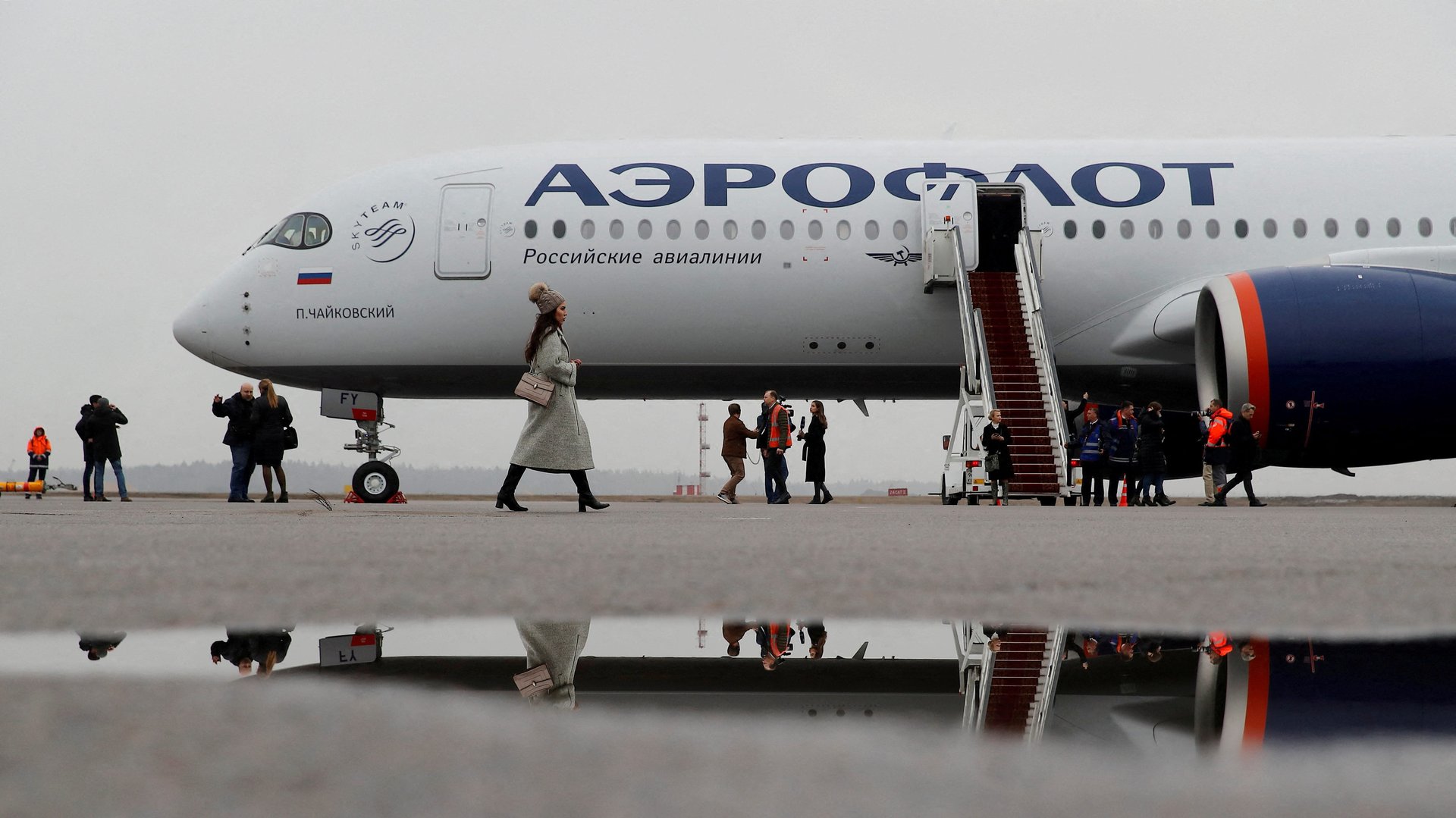How sanctions are bringing Russia’s airline industry to a grinding halt
Aeroflot, Russia’s flag carrier, will stop all international flights on Mar. 8—partly because Western governments have closed off their airspace to Russian planes, but also because companies that have leased planes to Aeroflot are trying to repossess them.


Aeroflot, Russia’s flag carrier, will stop all international flights on Mar. 8—partly because Western governments have closed off their airspace to Russian planes, but also because companies that have leased planes to Aeroflot are trying to repossess them.
Under EU sanctions, leasing companies—which buy more planes than airlines themselves—must end their contracts with Russian airlines by Mar. 28. At least 600 planes in Russian fleets—more than half of all commercial planes in the country—are leased. One firm alone, the Dublin-based AerCap, has 152 planes in Russia and Ukraine, valued at around $2.5 billion, according to data from IBA Group, an aviation consultancy.
In a Feb. 28 SEC filing, AerCap revealed that “approximately 5% of AerCap’s fleet by net book value was on lease to Russian airlines.” An AerCap spokesperson refused to comment on how the company plans to recover its aircraft.
In a Mar. 5 statement, Russia’s airline regulator warned of a “high risk of Russian airlines’ planes being held or seized abroad.” Two planes have already been taken overseas, in Istanbul and Mexico City, according to ch-aviation, an airline intelligence provider. Another Aeroflot plane, a 10-month-old Airbus A321neo, narrowly avoided being reclaimed in Cairo on Mar. 2, an aviation industry publication called The Air Current has revealed. But for repossessions to happen at scale, companies will need months. Russia’s decision to keep its planes within its borders makes seizures harder.
The Russian aviation industry is headed for a big freeze
The sanctions have brought the industry into uncharted territory, said Richard Aboulafia, the managing director at AeroDynamic Advisory, an aviation consultancy. The Cape Town Convention of 2001 governs the terms under which planes are leased and seized, but “it didn’t really plan for wars and sanctions,” Aboulafia said. If leasing companies have to write off their assets, as seems likely, they cannot look to insurers either. “The bizarre thing is, on Feb. 28, the EU gave these companies a month to unwind their leasing contracts, but insurance policies were rendered null and void under the sanctions almost immediately,” Aboulafia said.
In the Russian market, Western aircraft manufacturers like Boeing, Embraer, and Airbus have pulled out, which means they will no longer sell spare parts or repair their craft in Russian fleets. To keep domestic flights airworthy, airlines will have to exhaust their supplies of parts and then start cannibalizing components from planes.
Russia may also have to buy uncertified parts and second-hand planes from sellers in China or other countries, the way Iran did through its years of sanctions. Mahan Air, Iran’s first private airline, set up agents and front companies in countries like Indonesia, the UAE, and Malaysia, to buy spares at several times the market price and send them back home, Quartz reported in 2019.
But provisioning “a small, aging Iranian fleet with this kind of subterfuge was easier than for a big modern fleet like Aeroflot’s,” Aboulafia said. “No one knows exactly what stocks of parts Aeroflot has, but I suspect these planes will last weeks or months. Then they’ll probably have to end up as objets d’art at some open-air museum outside Moscow.”
If the war continues, Russia may end up as an aviation black hole. Some airlines, such as Turkish Airlines and Emirates, are still serving Russia. But it’s unclear how long they will continue, so Russians wishing to leave their country will feel compelled to do so sooner rather than later. And if domestic flights drop thanks to a drastic lack of planes, Russians will be rendered into an immobility that is utterly unfamiliar in the 21st century.